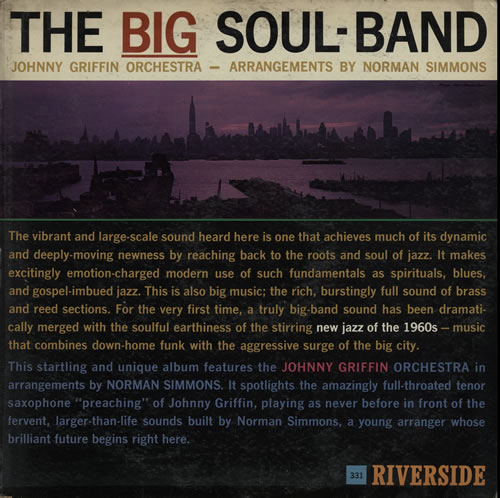A look at Johnny Griffin’s side dates around the time of The Big Soul-Band’s release in 1960 shows he was a very sought-after player. No wonder, because the ‘Little Giant’ decidedly had his chops together, playing masterfully executed fast runs, all the while retaining a heartfelt sense of the blues. Cooperation with Art Blakey, Thelonious Monk, Clark Terry and John Coltrane, and solo endeavors on the Blue Note and Riverside label resulted in very positive critical acclaim. Thus, by the time the idea of putting out a record of grass roots jazz took fruition, Griffin was ready for it.
Personnel
Johnny Griffin (tenor saxophone), Harold Mabern (piano), Bobby Timmons (piano), Clark Terry (trumpet), Bobby Bryant (trumpet), Charles Davis (baritone saxophone), Edwin Williams (tenor saxophone), Julian Priester (trombone), Matthew Gee (trombone), Pat Patrick (alto saxophone), Frank Strozier (alto saxophone), Bob Cranshaw (bass), Victor Sproles (bass), Charlie Persip (drums), Norman Simmons (arranger)
Recorded
on May 24 & 31 and June 3, 1960 in NYC
Released
as RLP 331 in 1960
Track listing
Side A:
Side A:
Wade In The Water
Panic Room Blues
Nobody Knows The Trouble I’ve Seen
Meditation
Side B:
Holla
So Tired
Deep River
Jubilation
And forget the concept. There was one, but its execution is wholly unforced. The album kicks off with a sweeping version of Wade In The Water. The pace of the album is set: a solid rythym section of drummer Charlie Persip and either bassist Vic Sproles or Bob Cranshaw, who spend much of their time in the A and E strings, therefore adding a definite down-home feeling, supports a brass and reed section that would please both Oliver Nelson and Count Basie. Griffin’s tenor beautifully weaves in and out of that big sound with sudden bebop stabs and lenghty gospel shouts.
Meditation listens like a suspence story should read, it builds up tension making use of Norman Simmons’ subtle score and a switch from delicate brush work to exciting press rolls by Charlie Persip, to a release that has Griffin telling a story you could meditate on for hours.
If you think side A is good, try side B. Holla puts you right where you want to be if your left ear digs Brother Ray saying ‘What I’d say’ and your right ear enjoys the halleluja of the Twenty or Thirty Blind Boys of Alabama. Mentioning the inclusion of Bobby Timmons’ So Tired (Timmons, incidentally, has guest spots on Meditation and Nobody Knows The Trouble I’ve Seen) and Deep River should give you an idea of what this album is about. While So tired is executed properly, it doesn’t reach the heights of either Timmons’ or Cannonball Adderley’s Quintet’s performances. Deep River is a jubilant affair. Initially, brass and reeds are left out, leaving space for intimate interplay between Griffin and the rhytym section, only to return in the good sense of bombast. I wouldn’t say that I didn’t know where I currently resided but Rampart Street seemed pretty close!
Jazz can do you like that. Here’s a record that has been gathering dust in my cabinet for about fifteen years and up pops a different favorite tune everytime I listen to it now. Rest assured that The Big Soul Band ages as well as any Ardbeg scotch is famous for doing.

